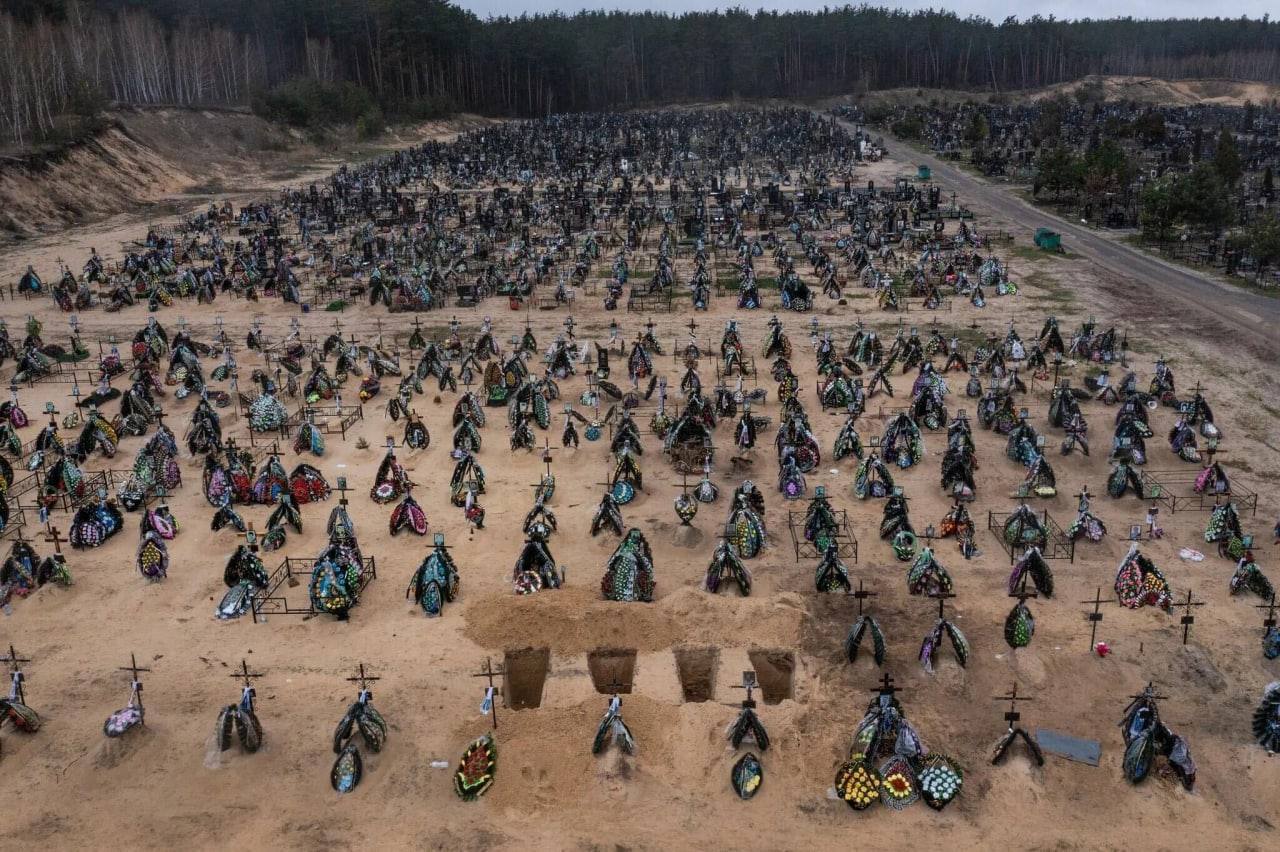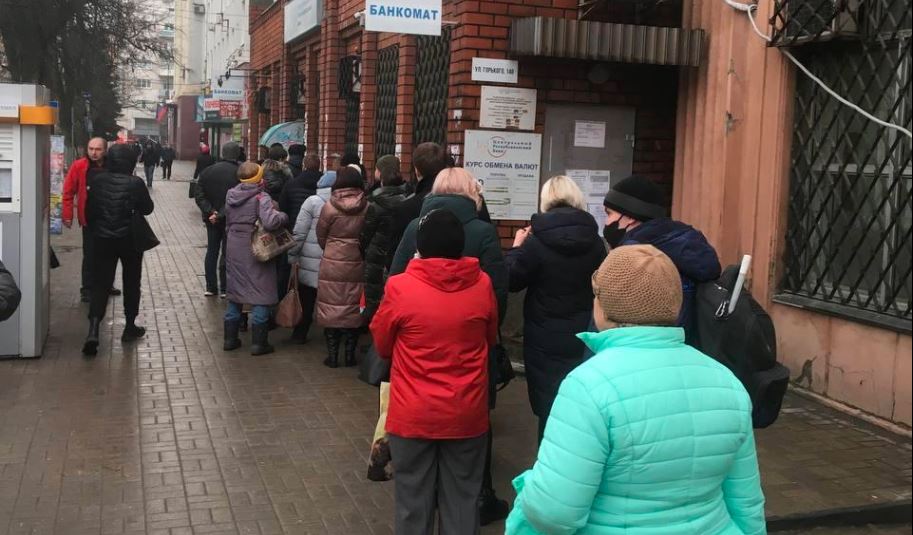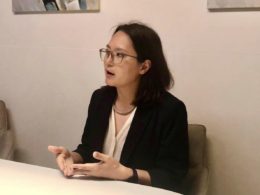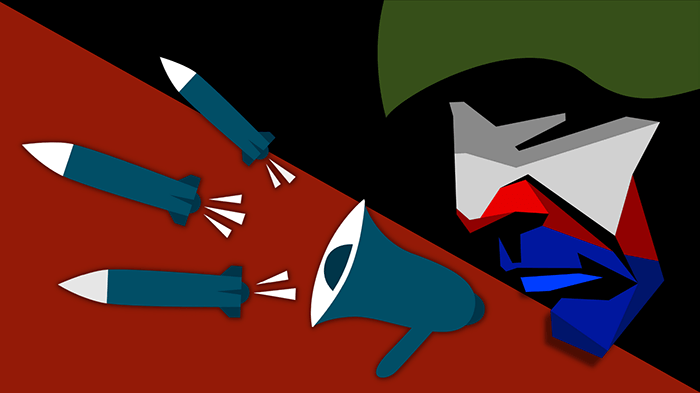Editor’s note: This report summarizes several lectures during the past year by Timothy Snyder, Yale University Richard C. Levin Professor of History and permanent fellow at the Institute for Human Sciences in Vienna, in which he provides definitive facts about why Russia’s war is a Ukrainian genocide. Snyder is the author of many books, including “Bloodlands: Europe Between Hitler and Stalin,” published in 2010.
“We will kill 1 million. We will kill 5 million.”
“We will obliterate them all.”
“We will drive the children into the raging river. We will throw the children into burning huts.”
“They should not exist at all.”
“We should execute them by firing squad.”
You might be thinking reading the above that these are statements from a distant past. However, these are just a few quotes from Russian state television channels from October 2022.
The subject of genocide is an uncomfortable subject because it lays bare the disturbing reality of the human capacity for cruelty and collective indifference. Yet it must be confronted.
Russia’s war against Ukraine has been genocidal from the beginning.
While objections exist to this classification, Snyder refutes each of them as follows.
Countering objections to defining Russia’s war as Ukrainian genocide: the facts
- Other crimes are being committed in Ukraine as well, and genocide is not one of them.
- Snyder points out that the committing of other types of crimes and the perpetration of genocide in Russia’s war against Ukraine are not mutually exclusive. The easiest crime to prosecute currently occurring in Ukraine is that of a war of aggression. This category of crime is among a quartet outlined by Philippe Sands, a University College London Professor of the Public Understanding. He also is the author of the 2016 book, “East West Street: On the Origins of ‘Genocide’ and ‘Crimes Against Humanity.’” The three other crimes Sands identifies as part of the quartet are war crimes, crimes against humanity, and genocide. Snyder states that all four are happening in Ukraine.
- The crimes being committed are impossible to prosecute, no one has jurisdiction, so genocide is not being committed.
- This argument is equivalent to an evasion. Describing the war in Ukraine as genocide now is a description of what is happening in the present—it is not laying the foundations for future prosecution. Discussing the war in the context of genocide also determines how we remember this war in the future. Most genocides are forgotten because they were never noted in the first place.
- This war does not feel like genocide.
- Snyder calls this a type of “elemental objection.” It rarely ever feels like genocide, and it almost never feels like genocide from the outside. The varied sense of distance and that very lack of solidarity with the victims is an integral element of genocide itself. It is that feeling that somehow this is not genocide that can actually be part of the genocide. It is a way in which it is impossible to be a bystander—if you choose not to see something that is happening, you are taking part in the genocide. People think to themselves that “we cannot possibly be bystanders and therefore, it’s not a genocide” or “we are not the kind of people who would be bystanders to genocide.”
Genocide is a systematic approach to eradicating a group of people
In the vernacular, the word genocide is often used to mean, “they killed every single person.” But that is not what the word genocide means legally.
According to the 1948 United Nations Convention on the Prevention and Punishment of the Crime of Genocide, if any of the following actions is present, it is genocide:
- Killing members of the group.
- Causing serious bodily or mental harm to members of the group.
- Deliberately inflicting on the group conditions of life calculated to bring about its physical destruction in whole or in part.
- Imposing measures intended to prevent births within the group.
- Forcibly transferring children of the group to another group.
Every single one of these has played out in Ukraine. We’ve witnessed them unfold on live television and social media, heard stories from victims, and read reports by international organizations about the scale of atrocities.
Invading Russian troops murdered tens of thousands of civilians in Mariupol in what the Atlantic Council described as “one of the 21st century’s worst war crimes.” Russia routinely targets Ukrainian civilians and infrastructure. Repeated Russian bombardment of Odesa has destroyed historic sites. Executions have taken place in every territory Russia has occupied. Ukrainian troops discover death pits of corpses with visible signs of torture in each settlement they liberate. Russians use filtration camps to detain, starve, torture, and kill civilians.
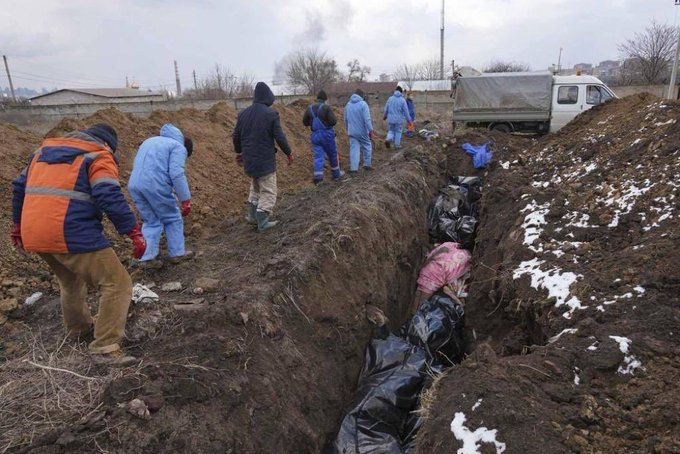
The Russian military employs the systematic use of torture in Ukrainian land they’ve occupied since 2014. Torture is an ordinary aspect of Russia’s regime. Russia also has deported up to 4.7 million Ukrainians. That represents almost 10% of the country’s estimated population of 45.5 million in 2013.
Russia has leveled several Ukrainian cities, creating landscapes not seen in Europe since the Second World War. In many still standing, Russian drones and missiles have hit sources of electricity, water, and heat, depriving civilians of life’s basic necessities. Russian propagandists and public figures make no secret about this, boasting on TV about such attacks.
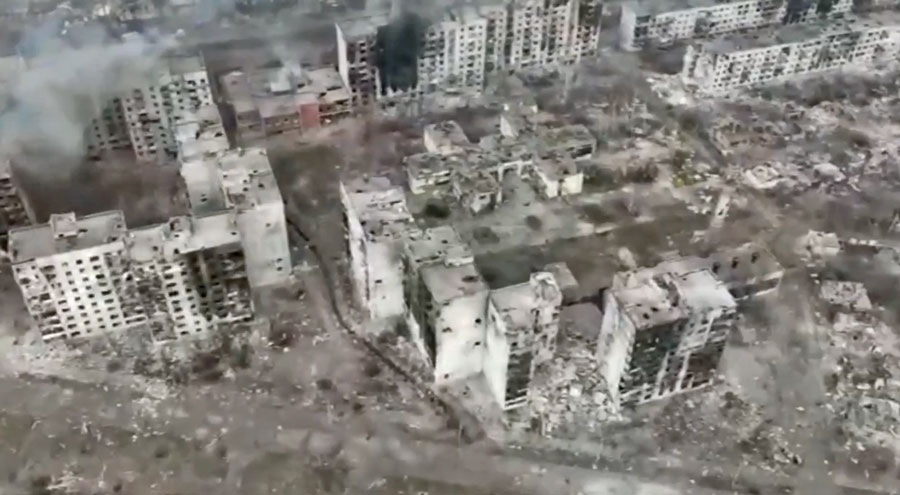
Tragic consequences of Russian troops’ systematic use of rape as a weapon of war include women who do not wish to raise Ukrainian children. Testimonies from victims and Russian perpetrators (voluntarily post-surrender and from leaked telephone conversations) often have revealed that specific genocidal purpose behind rape. The filtration camps and deportations of Ukrainians also prevent Ukrainian women from giving birth. Once in captivity, Ukrainian women are screened for fertility by their Russian captors. Russians send fertile women and captured children to locations in Russia to curtail Ukrainian population growth. The deported women may then become mothers of Russian children, while the deported children will grow up Russian.
“Three Russian soldiers raped my mother and sister. The fourth made me watch.” Hundreds of cases of rape by Russian soldiers in Ukraine
The British government in July put the figure at more than 19,000 children that Russia has forcibly deported. The deported children are then “adopted” by Russian families. Even Russia’s Commissioner for Children’s Rights, Maria Lvova-Belova, “adopted” a Ukrainian child. The International Criminal Court has accused Lvova-Belova and Putin of committing war crimes. These children have been deported, so they can never form a Ukrainian community again.
Russia admits deporting 700k Ukrainian kids. “Proof for ICC” says Ukraine
Evidence exists that each of the five legal definitions of genocide is happening in Ukraine. Though only one is necessary for a situation to rise to the level of genocide, all five are taking taking place in Ukraine.
How we know Russia is intentionally committing genocide in Ukraine
The UN Convention states that “genocide means any of the following acts committed with intent to destroy, in whole or in part, a national, ethnical, racial or religious group.”
A natural objection that arises is the question: How do we know about intention? Since we can never get inside someone else’s mind, how can we be 100% sure about intention?
Unfortunately, this is where much of the debate about genocide in Ukraine is focused on right now.
If we adopted the view of intention that requires dwelling deep inside perpetrators’ minds, no law involving murder or a number of other crimes we prosecute every day would be possible.
Every day, we make jurisprudence judgments about intention. We do it without the need for telepathy. The reason we apply the telepathy standard to genocide but not to other crimes is that we would prefer to think it is not genocide.
Another way individuals counter the intention argument is to say something like, “There is no piece of paper where the leader of the country specifically confesses to the detailed intention to carry out exactly the crime that has taken place.” This is true. There never is. There isn’t a single one for the Holocaust. There is no order from Adolf Hitler outlining in detail how the crime would be committed. However, there are other pieces of evidence, which, when using basic historical or legal judgment, we can reasonably establish that Hitler had the intention to commit genocide. Those include the rhetoric and documents associated with the Wannsee Conference.
Snyder makes the case that the problem confronting us with the genocide Russia is committing against Ukraine is that we are overwhelmed with evidence of intention, not that there is a lack of evidence regarding intention.
As a consequence, the temptation, as we hear more evidence of intention, is to ratchet up the standard for what would qualify as genocide. The more we hear about the intentions of Russia, the more we are likely to think to ourselves, “I’m used to that. Now, I want something even more shocking to prove that it was genocide.”
Genocidal intent is everywhere, and you need not look far. Here is a sample of quotes from various Russian officials and commentators during the past several months:
- “We can draw only one conclusion: the Ukrainian question has to be solved once and for all. Otherwise, it may be too late… What comes to mind right now, I will say it again, is to destroy every living thing in the Kharkiv region as a punishment and as a deterrent.” – Olga Skabeeva, State TV Host (4 June 2023)
- “Ukrainians should be offered a re-education matrix that should help them freely and consciously, but at first under strict control, acquire new state structures and institutions of power at all levels, a new economic policy and a new identity.” – Vladimir Skachko, a journalist at the Russian state-run Ukraina.ru (5 June 2023)
- “In the current situation, it is obvious that the preservation of Ukraine as an allegedly independent state does not make any sense. The security of Russia as a whole and of individual citizens requires the complete liberation of historically Russian lands. Ukraine must be destroyed.” – Vlad Shlepchenko, a journalist at the pro-Putin nationalist media outlet Tsargrad (31 May 2023)
- “The language of the [Ukrainian] enemy should not be studied. It should not be respected, it should not exist! There shouldn’t be any horrible signs in this language, no materials [in Ukrainian], nothing at all! This is an incitement to ethnic hatred, it’s prohibited! This [Ukrainian] language should not exist… Neither this [Ukrainian] nation nor this language should exist! Cleanse it all out, cleanse out all of its sources.” – Alexei Didenko, State Duma member, Russian State TV excerpts (29 May 2023)
- “Why will Ukraine disappear? Because nobody needs it. There’s a nice perspective ahead: to permanently put the nouveau-Ukrainian blood-sucking parasites on the decrepit EU’s arthritis-crippled neck […] Russia doesn’t need Ukraine. A threadbare quilt, torn, shaggy, and greasy […] We don’t need unterukraine. We need Big Great Russia. […] Nobody on this planet needs such a Ukraine. That’s why it’ll disappear.” – Dmitry Medvedev, Deputy Chairman of the Security Council of Russia and former Prime Minister and President, Twitter (February 4 – 8 April 2023)
- “For over 30 years, we took it for granted that Ukraine exists and that everyone who lives in Ukraine is Ukrainian. Why, all of a sudden? Says who? Where did you get that? … These people, whose ethnic origins have no meaning, they can be anyone at all—Ukrainians, Russians, Jews, Crimean Tatars or even Tanzanians. But any person who takes on the identity as a citizen of independent Ukraine, sings this hideous thing called the Ukrainian anthem, warps his brain by speaking someone else’s language, which is not his native tongue. It’s unfit for speaking, you can only sing in it. It’s simply ridiculous. He rejects the huge body of Russian literature. He rejects himself, rejects the entire Russian culture. And if you, being Russian by culture, reject the Russian culture, what is left within you, what do you become? You simply become an animal! Everything else that makes a human human, especially, pardon me, a civilized human, there is none of that in these people! … We see an external manifestation of a mass insanity among many people, but of course, not all of them… This is us, this is our land! This is our land!” – Sergey Mardan, State TV Host (12 June 2023)
- “But if you don’t want us to change your minds, then we will kill you. We will kill as many of you as we have to. We will kill 1 million, or 5 million; we can exterminate all of you until you understand that you’re possessed, and you have to be cured.” – Pavel Gubarev, a politician in the so-called Donetsk “People’s Republic” (11 October 2022)
- “[Ukrainian children] should have been drowned in the Tysyna [river], right there, where the duckling swims. Just drown those children, drown them right in Tysyna [river]… Whoever says that Moskals occupied them, you throw them in the river with a strong undercurrent… Over there, every piece of shit little house, there are masses of awful, monstrous little houses, they shit all over the Carpathian Mountains. Carpathian Mountains are disgusting, every hut over there is called ‘smerekova khata.’ Shove them right into those huts and burn them up… [Ukraine] is not supposed to exist at all.” – Anton Krasovsky, then Director of Broadcasting for Russia Today, Russian State TV excerpts (23 October 2022)
Just Security, an online forum for analysis of security and foreign policy issues is documenting publicly available statements from a range of Russian sources which capture Russia’s genocidal rhetoric against Ukraine. It can be accessed here.
The nine ways of evaluating genocidal intent
Snyder discusses nine ways in which historians evaluate intent: colonial, apologist, dehumanizing, narcissistic, escalatory, metaphysical, fascist, replacement, and exceptionalist.
1. Colonial
Much of historical genocide is associated with the phenomenon of European and other colonialism. The language that Putin has used since 2011 about Ukraine has consistently invoked “civilization”—colonialism’s central category. During the past decade, but with greater intensity in the last couple of years, Putin has made the claim that Russia exists as a state and nation, but Ukraine does not. This claim has been parroted throughout the war on Russian state-run television channels and media outlets. And it has been echoed by Russian politicians, celebrities, commentators, and academics.
The myth of “historically Russian Crimea”: colonialism, deconstructed
This is the absolutely predictable normal way in which European colonial powers referred to the political and social groups that they encountered during the colonial expansion of European powers several centuries ago. The power of this imperial stance allows a state to say who exists and who does not exist, and it allows them to declare the “always” and the “nevers.” An example of this imperial rhetoric is that of Crimea “always” being Russia or that Ukraine and Russia were “always together.”
These “always” imply “nevers.” If Ukraine was always together with Russia, then we can dismiss the Ukrainians with their self-conscious political history, culture, traditions, and language. And, we can dismiss anything that seems to challenge a Russian narrative.
If Crimea were always Russia, then we can completely disregard the 600 years in which a different state existed in Crimea—which lasted longer than any Russian state ever has. We can forget entirely about the indigenous people of the Crimean Peninsula, the Crimean Tatars, who were dispersed in the late 18th century when Russia absorbed for the first time the peninsula, and who also were forcibly ethnically cleansed in the spring of 1944 under Joseph Stalin’s orders.
We can also forget about the fact that none of the regions Russia currently occupies in the south and east of Ukraine, and which Russia claims to have annexed, ever belonged to Kyivan Rus—the first state comprising the Eastern Slavs and a state to which Russia claims is the rightful successor.
2. Apologism
This phenomenon manifests itself when one’s attitude towards an event in the past reveals a specific intent to change the future. Neo-Nazis’ claims that the Holocaust never happened, for instance. What is meant by this? Neo-Nazis mean they would like the Holocaust to happen again. When you deny a specific crime perpetrated in the past by a people with whom you identify, you reaffirm that crime. The victims always understand this.
Russia began its war against Ukraine by reaffirming a memory law that made it a crime to recall that the Soviet Union and Nazi Germany were allied in 1939 and that they jointly started the Second World War with the invasion of Poland. The effect of this is that Russia is able to absolve itself of any association with Nazism and instead to export any possible “Nazi-ness” to other people and groups.
During the current war, Russia has destroyed monuments to the Holodomor—the artificial famine perpetrated by the Soviet Union’s leadership that killed millions of Ukrainians in 1932 and 1933. Russian language around the destruction of the monuments is particularly worth studying as it states that there was “no intention there” to kill Ukrainians—it was simply nature taking its course. While destroying these monuments, the Russian army was also simultaneously deliberately destroying Ukrainian water and power supplies. Of course, once you do that, everything that happens afterward is just nature taking its course.
3. Dehumanizing
There is a very specific way in which Putin claims that Ukrainians do not exist that Holocaust scholars will find familiar. Ukrainians do not exist because the people who claim to be Ukrainian are not truly from here. They’re not really attached to the land. They are alienated from the soil. The people who mistakenly believe they are Ukrainian—this is a mistake because no such thing as a Ukrainian exists—have been seduced by Habsburgs, Germans, Poles, Americans, or the European Union. In other words, they have been seduced by an outside force, and it is from there where the sense of Ukrainian-ness comes from. They have false self-awareness. As a result, they do not know who they are. They have ideas that have come from the outside, and this makes them dangerous.
There is an echo here of Adolf Hitler’s view of the Jews. Hitler asked, Where do Jews belong? Jews belong nowhere. Putin asks, Where do Ukrainians belong? Ukrainians belong nowhere. Following this logic, a people exist only because of an alien threat, and its societal elite must be destroyed. As we now know, this was precisely Russia’s war strategy against Ukraine. Its genocidal strategy included kill lists comprising Ukrainian leaders spanning many echelons of society. This, in part, is what Putin meant when he announced “de-Ukrainisation” as a goal of the war.
By eliminating the Ukrainian elite, the Ukrainian masses would remember that they are Russians, then everything would spring back to its natural state. This was the key message of Russian propagandists. RIA Novosti, a popular Russian media outlet, in fact, accidentally published an essay stating that the outcome had occurred. The essay was a pre-prepared text written on the assumption that Russia would win the war in three days. It reported, in essence, we have destroyed the top level of Ukrainian society. The aliens, the elites, and the Ukrainian masses are now joyfully joining the Russian state.
4. Narcissistic
This genocidal idea posits that a people do not know who they are unless they compare themselves to others. Genocide is about you and your need for self-definition. It is possible to define yourself in opposition to others. Perpetrating a genocide is one of those ways of defining yourself. When Putin talks about conducting de-Ukrainization, de-Nazification, or de-Satanization, what he is conveying is that Russians exist insofar as they carry out this project of correcting another group of people. However, in none of these terms, and indeed not once during this war, can one find any language defining what Russia is.
Russian ideology: imperialism, militarism, and racism
What is truly in doubt, as reflected by official Russian statements, is: What is Russia? What is the future of Russia? What is Russia’s purpose? During this war, the definition of Russia has been narrowed by the Russian leadership itself to the destruction of Ukraine. Russia must commit genocide against Ukraine because it will instruct Russians who they are, and no one will be able to take that away from them.
Scholars of fascism would refer to this as the politics of Us vs. Them. As the Nazi legal theorist Carl Schmidt put it: Politics begins when we name the enemy. We can name him Satan and call him a Nazi. It does not matter. We name the other in some way, and we can destroy him.
5. Escalatory
When Hitler, in 1941 and late 1942, made a cluster of statements about the necessity of exterminating the Jews, he did so against the background of the alliance among the Americans, the British, and the Soviets. That alliance ultimately spelled the doom of the Third Reich. Hitler argued these developments could only be the work of the Jews. It was impossible for Hitler to accept that capitalists and communists were working together. The only explanation was that the Jews had orchestrated the arrangement. There is a similar narrative in how Russian officials describe Ukraine.
Russia was not able to defeat Ukraine immediately. Why? Ukrainians are agents of international powers, that they have been manipulated by outside powers. It is impossible for Putin and Russia to conceive of the reality that Ukrainians themselves could be inflicting such damage to the Russian military on the battlefield. All the more reason that Russia must destroy Ukraine.
Another escalatory argument that supports committing genocide against Ukraine and Ukrainians is because Russia failed to win the war by killing the Ukrainian elite, the only solution is to kill more Ukrainians. This is what Pavel Gubarev, the politician in the so-called Donetsk “People’s Republic,” meant when he said, “We will kill one million, or five million, we can exterminate all of you until you understand that you’re possessed and you have to be cured.” The more people who continue to say that they are Ukrainian, the more of them must be killed.
6. Metaphysical
Russia has created an alternate reality that only they and their supporters can see. This strategy also echoes one used by the Nazis against the Jews. The Nazis claimed that Jews spread mental illness. A frequent argument made in Russian propaganda is that Ukrainians actually are Russians who are mentally ill and can only be cured by the application of violence.
Russians also draw on religion by claiming that Ukrainians are possessed by Satan. As ludicrous as this may sound, this is a mainstream argument in Russia. Gubarev has claimed Ukrainians are possessed by Satan. This renders Ukrainians unable to realize that they are Russians. Russia must commit mass exorcism. But if that fails, Russia has no choice but to kill Ukrainians.
For a decade, Putin has propagated the idea that Russia and Ukraine were united by God Anyone who challenges this connection is an enemy.
On his final visit to Kyiv in 2013, Putin stated that Ukraine and Russia were connected as a matter of God’s will. In his falsifications of Ukrainian history, Putin repeatedly makes the argument that Russia and Ukraine must be together forever because of Volodymyr the Great’s Baptism in 988 A.D. The baptism represents a ritual of cleansing, which determines who is eternally in the right. Russia claims eternal purity while claiming Ukraine is Satanist.
Putin has cited the Russian Christian fascist thinker Ivan Ilyin for the past decade to propagate these ideas, most recently on Sept. 30, 2022, during his speech on the annexation of Ukrainian lands. Russian propagandist Vladimir Solovyov, when asked, “What are we fighting against?” replied that “we are fighting against Satanism.” In October 2022, Russian media outlet TASS reported that a member of the Security Council of Russia—the highest organ of the Russian state—had defined the task of the Russian army in Ukraine as de-Satanisation. The same description of the war was echoed by Chechnya’s warlord leader Ramzan Kadyrov.
7. Fascist
Russia is engaging in a metaphysical tradition that is a kind of Christian fascism. In this tradition, the world has been fragmented. There is only one way to heal this. Russia’s mission, as the only unfragmented country, is to bring the world back to a totality. By definition, this means that no matter what Russia does, it is for the greater good. Russia is always innocent because it is the only hope for the restoration of the world.
8. Replacement
Putin worries aloud that his race is going to be overwhelmed by the number of non-Russians and non-Orthodox people. In the Telegram channels of Wagner mercenaries, replacement theory conversations are ubiquitous. By kidnapping fertile Ukrainian women and Ukrainian children who can be assimilated into Russia, the country can increase the Russian population. Simultaneously, Russia sends young men to die on the battlefields of Ukraine who are from indigenous populations from the Caucasus and Asia.
9. Exceptionalism
Put simply, this genocidal idea may be summed up as, the rules do not apply to us. It creates Russia as a desired exception in the world. By whose definition is the war against Ukraine genocide? The “West is insisting on a rules-based order. Where did that come from anyway? Who has ever seen these rules? Who agreed or approved them?” Putin asked those questions during his September speech last year when he announced the annexation of Ukrainian territories. He added that “Russia is a great thousand-year-old power, a whole civilization, and it is not going to live by such makeshift, false rules.”
This kind of rhetoric is consistent with Nazi legal theory that stipulates that law is not about universal rules. Schmidt, the Nazi legal theorist, said that power begins from the ability to make an exception. He who can make an exception is he who rules. Putin is following this playbook to justify the genocidal war against Ukraine.
How the Holocaust informs us about Russia’s Ukrainian genocide
It is clear what Russia’s intent is in its war against Ukraine. And it is clear that Russia’s crimes as it has perpetrated this war fit all five definitions of genocide according to the 1948 UN Convention.
Those who still cling to the argument that what is occurring in Ukraine is not genocide may be claiming something like, “Well, it’s not the Holocaust, right?”
It is crucial here to see the Holocaust not as a tool of forgetting but as a tool of remembrance. Not as a way of dismissing other events but as a way to see them as they occur. If we place the Holocaust outside of history by saying it is unique, we are attempting to assert our own virtue. But, in reality, this action is the opposite of virtue. If we say what’s happening in Ukraine, or another part of the world, is nothing like the Holocaust, we are ignoring the facts before us and divorcing ourselves from the collective responsibility to take action to stop it.
History is the search for patterns. It is the search for the telling detail. It is the search for self-awareness, it is the search for knowledge that allows us to see or not see. Regarding the Holocaust and today’s genocide in Ukraine, we can say surely not now. Surely not here. Surely not on my watch. Surely the intention is not clear. Surely the actions are insufficient.
But in Russia’s invasion of Ukraine, everything is absolutely clear and sufficient. It has been from the beginning. All that remains is us and what we do next.
Edited by Mike Cronin
Related:
- This is what genocide looks like: Russian torture chambers in Kharkiv Oblast
- How ordinary Russians were turned into murderers and rapists through TV and smartphones
- Rape used in Ukraine as a Russian ‘military strategy,’ ‘deliberate tactic to dehumanise victims,’ UN envoy says




